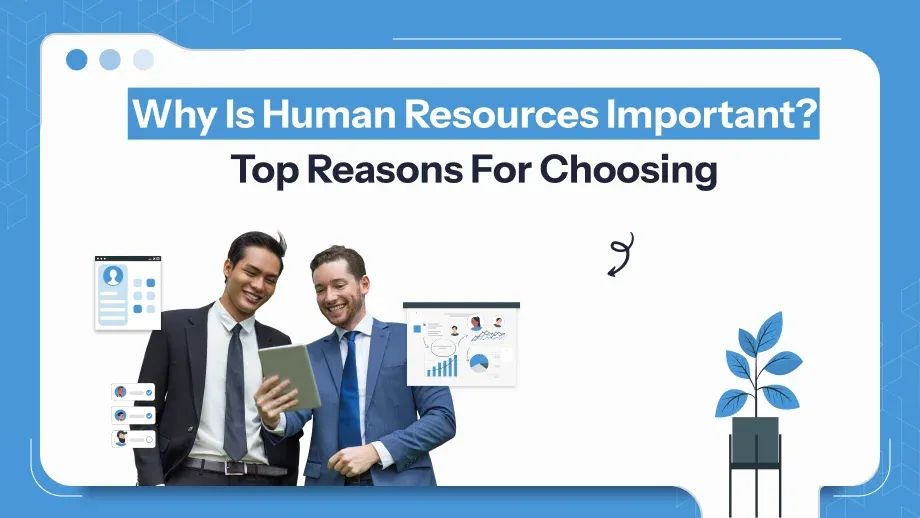
Human resources (HR) are frequently defined as the lifeblood of an organization. Of course, this is way beyond paying salaries or manning a recruiting table—it’s an environment for a working person and a successful business. Why Is Human Resources Important, though? Let’s explain why it is so imperative for companies and how its presence adds up to achieving long-term success. If you’ve ever wondered about the importance of HRM or how a strong human resource team impacts organizational performance, this guide will provide clarity. In addition, integrating human resources analytics can provide valuable insights to enhance organizational performance and HR strategies.
What is HR?
Human Resources is the department of an organization that manages people, which are the most precious assets. From recruits to creating workplace culture, HR is essential in ensuring a business runs smoothly and effectively.
This is not just an administrative job but involves recruitment, employee engagement, compliance, payroll, training, and performance management. In other words, it acts as a connecting link between employees and management ensuring they both are working in harmony in pursuit of common goals but keeping job satisfaction intact.
What Does Human Resources Do?
The role of human resources extends beyond the hiring and firing process. It is an all-rounded function that involves:
- Talent Acquisition: The right talent acquisition for the organization to meet the organization’s needs.
- Employee Training and Development: The process equips employees with the requirements to grow and succeed.
- Compliance Management: The process for ensuring that the organization observes labor laws and regulations that offer protection for the company and the workforce.
- Performance Management: These are processes that track improvements in the performance of the worker through constant reviews and feedback.
- Employee Engagement: A Positive Work Culture to Foster Motivation and Retention.
Without HR, it would be difficult for a business to manage these fundamental activities, thus showing the importance of human resources is essential to any business’s daily operation.
Why Is Human Resources Important?
Why Is Human Resources Important are the backbone of any organization. They ensure that the most valuable asset-the people-are managed well. More than just administrative tasks, human resources are important to maintain a positive workplace culture, ensure compliance, and drive growth in an organization. Some more reasons why human resources important are so important include:
Acts as a Strategic Partner
It is not merely managing employee data but rather aligning the workforce to the company’s vision and goals. Thus, HR can become an important part of business growth through strategies for recruitment, retention, and employee development.
Attracts and Retains Top Talent
HR plays a pivotal role in designing hiring processes to acquire the best talent. At the same time, it looks out for a positive employee experience through benefits, growth opportunities, and workplace satisfaction that reduce employee turnover rates.
Builds a Positive Workplace Culture
A powerful human resource team works toward an environment of trust, collaboration, and inclusivity. Policies developed by HR will emphasize fairness, equality, and employee well-being, impacting morale and productivity directly.
Enhances Employee Development
HR identifies skill gaps and offers training programs to help employees grow. This ensures employees are equipped to handle their roles effectively and are motivated to achieve long-term career goals within the organization.
Ensures Legal Compliance
It is tough to navigate intricate labor laws and regulations. why is Human Resources Important ensures compliance with those laws and prevents the organization from any potential legal issues and penalties. Compliance becomes easier and more efficient with help from tools like HRMS Payroll Software in India.
Improves Payroll and Benefits Management
Payroll handling is a precise and on-time affair since it boosts the morale of employees. HR takes all care while handling salaries, benefits, and tax deductions, frequently using tools such as hrms tools in India for easy handling.
Focuses on Mental Health and Wellness
HR designs performance management systems to monitor individual progress for constructive feedback or to align goals with organizational requirements.
Optimizes Performance Management
why is Human Resources Important designs and implements performance management systems to track employee progress, provide constructive feedback, and align individual goals with organizational objectives.
Onboarding Experience
Firstly, new employees are integrated and smoothened into an organization through HR. So, the employee onboarding software ensures that HR introduces new employees to structured, success-oriented onboarding.
Supports Organizational Change
HR helps businesses navigate changes, such as restructuring, mergers, or adapting to remote work environments. They work as a middleman between management and employees, ensuring the smoothest possible transition.
The Changing Role of HR and Its Ongoing Importance
Throughout these years, the why is human resources important has changed substantially. HR is no longer all paperwork or hiring; it becomes a strategic partner in a successful business.
Shift Toward Employee-Centric Approaches
The modern HR teams are employee-centric in policy formulation. Starting from improving work-life balance to inclusion, HR prioritizes employee well-being for satisfaction and retention.
Use of Technology
The use of tools such as cloud HRMS solutions and employee onboarding software automated routine tasks so that the HR teams could move towards strategic objectives. Technology has streamlined attendance tracking, payroll management, and compliance issues.
Strategic Partner for Growth
why is human resources important is viewed today as a strategic partner that will help in aligning employee goals with business objectives. HR helps create a culture of innovation, productivity, and collaboration.
Why HR Remains Important:
- Ensures compliance with labor laws.
- Enhances employee engagement and satisfaction.
- Drives talent acquisition and retention.
- Fosters a strong organizational culture.
The Cost of Not Having HR in the Organization
Failure to establish a strong HR function leads to several challenges for businesses. Here’s what happens when there’s no HR department:
Poor Recruitment Processes
No specific process is followed to select the right talent. Without an appropriate HR, there are high chances of unqualified or mismatched hires, resulting in higher rates of turnover and wasted resources.
Non-Compliance Risks
HR ensures that the businesses follow the labor laws and regulations. In the absence of HR, companies are likely to suffer from legal consequences of non-compliance, which further hampers their reputation.
Reduced Employee Engagement
Employees need guidance, recognition, and opportunities for growth. In the absence of HR, these essential areas remain unattended, and hence, low morale and low productivity are experienced.
Payroll Errors
The satisfaction of employees is related to the payroll processing aspects, as it requires proper tools, such as HRMS payroll software in india, which will guarantee proper calculation of salaries, taxes, and time. It is surely impossible without a single thing called HR or proper payroll tools to have error-free payroll processing.
Lack of Structured Training
Employee development is critical in business growth. Without HR, many training programs and performance reviews may slip through the cracks, leading to a lack of productivity overall.
Increased Turnover Costs
Replacing workers is a timely and costly process. Through HR, talent is retained by fostering positive workplace cultures and creating opportunities for growth.
The Impact of HR on Business Success
Why is human resources important are one of the most significant determinants for success in any organization. From hiring the right talent to making sure employees are satisfied, HR aligns the workforce with business objectives for long-term growth. Let’s find out how the role of human resources directly impacts business success.
Talent Acquisition and Retention
HR ensures that the business attracts and retains the best talent for the job, which is very critical in maintaining competitive advantage. HR reduces employee turnover through effective recruitment processes providing career growth opportunities and providing a skilled workforce.
Enhancing Employee Performance
why is human resources Important institutes performance management systems to monitor the employee’s progress and give constructive criticism. It helps employees link their personal goals with the organizational goals and, hence, increases productivity.
Building a Positive Workplace Culture
Why is human resources important is in creating an inclusive and collaborative work environment? A positive work culture will increase employee engagement, motivation, and satisfaction and, consequently, the bottom line of the company.
Ensuring Compliance and Reducing Risks
Compliance with labor laws and regulations is vital in avoiding legal issues. The HR teams monitor changes in the law and keep businesses compliant. Non-compliance leads to loss of money and loss of reputation.
Supporting Organizational Growth
As businesses grow, HR plays a key role in scaling operations. This includes workforce planning, training programs, and implementing technologies to manage larger teams effectively.
Tools That Enhance HR Efficiency
Technology has revolutionized how HR functions operate. Tools like hr management tools and cloud HRMS solutions make processes more efficient, allowing HR teams to focus on strategic tasks.
- HRMS Tools in India: Automate payroll, compliance, and attendance tracking.
- Employee Onboarding Software: This streamlines the onboarding process so new hires get a positive first impression.
- Cloud HRMS Solutions – flexibility and scalability, suitable for companies in the growth phase.
With the correct tools, the importance of HR becomes more significant, and can make better decisions faster and execute tasks quickly.
Conclusion
Why is human resources important are always at the core of a successful business because they form an integral part of recruiting the most skilled talent, fostering an appropriate workplace culture, and complying. Why is human resources important cannot be understated since it impacts both employee satisfaction and productivity as well as the overall business performance. To take HR functions to the next level, explore advanced solutions with HR software in india and even adopt tools such as HRMS tools in India and even cloud HRMS solutions for streamlined process execution.









